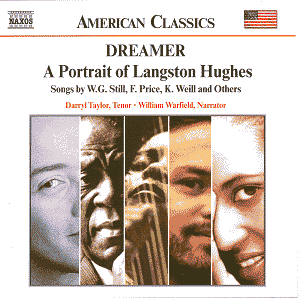Langston
Hughes was one of the first black writers to support himself solely
by writing. Commentator, novelist, poet and later librettist he
was at the fulcrum of the Harlem Renaissance, though he’d actually
been born in Joplin, Missouri in 1902. Like Paul Robeson the 1930s
saw him drifting ever Eastwards politically and he spent a year
in the Soviet Union; his social position was unflinching though
and he returned to America before the war and unhesitatingly supported
the American war effort. Gradually his literary work assumed a
more stage-orientated trajectory and he worked with Kurt Weill
on Street Scene (of which there’s an example on this disc) and
he collaborated on gospel inspired oratorios. He remained an important
example and a figure of inspiration and encouragement and one
to whom this disc pays homage. Included are contemporaries of
Hughes who set his verse and much younger composers who have been
inspired by them. A look at the head note shows that they range
from Dvořák-associate Harry T Burleigh and the eminent William
Grant Still to our contemporaries.
Naturally
the collection is inherently uneven in tone but is interspersed
by readings declaimed by William Warfield with great reserves
of identification. It might seem foolish in the extreme to prefer
his readings to some of the music but so be it; I do. The way
he sings the Weary Blues is a thing to hear. This must have been
one of the last recordings he made, at 81, in 2001 and it’s an
eloquent tribute to his personality with that famed bass-baritone
proving just as adept at poetics as it had proved to be on stage.
Of the composers Robert Owens strikes a rather Francophile note
in his contribution. Grant Still is in European Art Song mode
in A Black Pierrot, which despite the potential drama of
the verse, stubbornly refuses to do anything very notable. I liked
rather more Margaret Bonds’ The Negro Speaks of Rivers.
She studied at Julliard with Roy Harris and was later to become
one of Ned Rorem’s teachers and proves herself to be an acute
setter with a wide range of influences on which to draw. The appositely
black cadences inform this sensitive setting and the piano writing
(she was a pianist) is idiomatic and clever. Ricky Ian Gordon
writes something of a show tune out of My People taxing
Darryl Taylor’s tenor up high and this is juxtaposed with Florence
Price’s very parlour-cosy Song to the Dark Virgin.
Elsewhere
Weill shines brightly and the very cosmopolitan setting by Harriette
Davison of Hughes’ very cosmopolitan poem In Time of Silver
Rain feels just about right. Burleigh’s one setting is characteristically
affecting and by far the longest contribution comes in Erik Santos’
Dreamer, a setting of five of Hughes’ poems. Premiered
in 2001 there’s plenty of versatility and walking bass, also spoken
lines of text accompanied by harp - dramatic and theatrical. There
are gospel interjections, and some torch song vocalising over
swinging high hat percussion. There’s also some melismatic vocalising
over calmly rippling accompaniment sung way up high.
The
notes are text-less which, given the still relatively obscure
corner Hughes occupies and which this disc is attempting to address,
is a real pity. And the layout is quite poorly designed. Otherwise
a rather odd disc that never quite gets to grips with its ostensible
function but which does liberate some worthwhile music.
Jonathan
Woolf


